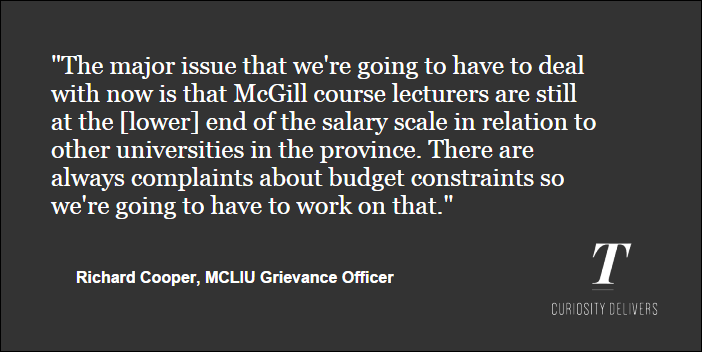On Friday, Sept. 18, the Special General Assembly of the McGill Course Lecturers and Instructors Union (MCLIU) met to vote on the proposed version of the union’s first collective agreement. The agreement outlines a number of important points between the employer, McGill, and the MCLIU, including seniority, hiring processes, salary and paid sick leave. The agreement passed with 96 per cent of the vote.
MCLIU President Raad Jassim played a major role in the formation of the agreement and explained the process behind crafting the articles.
“We went to the Minister of Labour and requested a conciliator, and we worked with them for about a year […]” Jassim said. “Then, we requested an arbitrator and the arbitrator helped with a few more articles. And finally it looked like we were able to do it on our own […] and we were able to actually come up with our collective agreement together.”
The collective agreement outlined a number of administrative points between McGill, and the MCLIU, including seniority, hiring processes, salary, and paid sick leave. It also outlined the number of courses a course lecturer is allowed to teach per year.
“We can teach up to seven courses a year […] so that’s a great achievement for our course lecturers,” Jassim said. “Other universities, such as Concordia, use just two courses per semester as their max. You can go beyond seven at McGill but you will not accrue seniority from those courses.”
The Sept. 18 vote allowed the MCLIU to pass the collective agreement in principle. Now, McGill and the MCLIU must formalize the agreement so that it can be officially signed. Robert Comeau, the director of labour and employee relations in McGill’s human resources department, has been involved in the ongoing negotiation process.
“What we’re having to do now is to write the official collective agreement, because when we negotiate, a lot of times either the employer or the union will just drop some of the proposals, so the numbering is wrong,” he said. “Second […] we have to come up with a French and English version [….] So we have to finalize those things to be able to officially sign, and then what we have to do is file it with the labour board to become official.”
The English version of the collective agreement is slated to be finished before the end of this week, which will allow for the official collective agreement to be signed within the coming weeks.
MCLIU Grievance Officer Richard Cooper has been involved in the negotiations process for eight years, and helped to form the union in 2011.
“Through the process of seniority and how seniority will affect the allocation of courses, [the collective agreement provides] a measure of job security that we didn’t have before,” Cooper said.
While the collective agreement will be in place for three years, the union is already thinking ahead to prepare for when negotiations come around again.
“The major issue that we’re going to have to deal with now is that McGill course lecturers are still at the [lower] end of the salary scale in relation to other universities in the province,” Cooper said. “There are always complaints about budget constraints so we’re going to have to work on that.”








